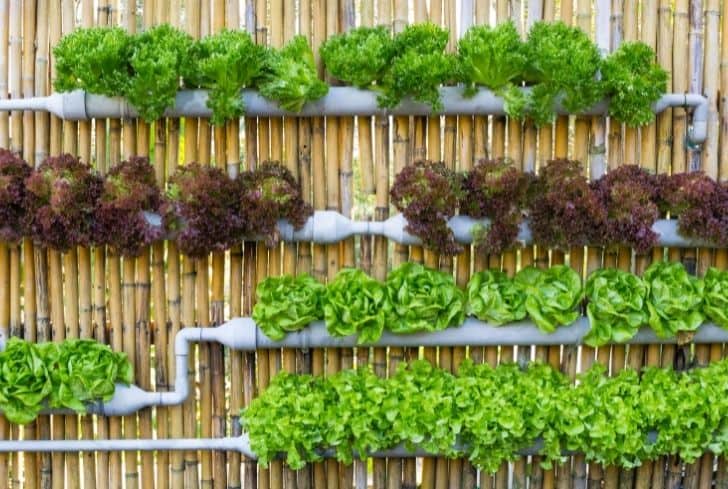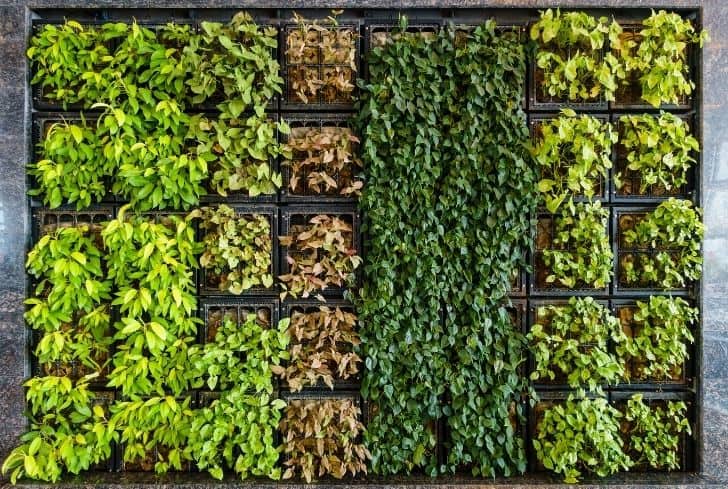A beauty to behold, having a well-pruned garden filled with beautiful flowers and plants is something everyone would love. Gardens are natural aesthetics, and they create a whole new feel and look to the environment.
Many people love to have a garden, but there is hardly any space to have a garden with the high-rise buildings surrounding us. Besides, most of us reside in apartment blocks, and we are not in control of what can be done in the surrounding. The few who own their homes, on the other hand, can easily cultivate a garden.
Many have resorted to using plastic plant pots to grow beautiful flowers to recreate the scenery and aesthetics. It has succeeded in creating the atmosphere, but it has not captured the actual feeling of having a garden. Plastic pots are different from having a garden.
There is a solution to that problem, a vertical garden. Vertical gardens have become very popular in recent times. They not only create the atmosphere of having a garden, but they also have economic, physiological, and environmental benefits. Dive in; let’s look at some of the benefits of having a vertical garden in this blog post.
What is a Vertical Garden?
Vertical gardening is a technique whereby vegetable plants and flowers are grown up and off the ground. The plants are held on a panel suspended vertically, making use of hydroponics. As funny as it might sound, vertical gardens have been in use since the ancient Egyptian civilization.
Vertical gardens are a good alternative to using plastic plant pots to grow plants in a restricted space. It is easier to maintain vertical gardens than potted plants, and vertical gardens take up less space than potted plants.
Vertical gardens are known by different names. Some people call them living green walls, moss walls, live walls, amongst other names. Vertical gardens can be as small as a picture frame, and they can be as big as a 70 feet wide masterpiece. They can be placed in hotel lobbies, residential backyards, or even offices.
There are two types of vertical gardens; your vertical garden choice depends on three factors: the aim, the environment, and the available space. The two types of vertical gardens are indoor vertical gardens and exterior vertical gardens.
15 Incredible Benefits of Having a Vertical Garden
Having a vertical garden is not only cool, but it also has a lot of benefits and advantages that you are not aware of. Many companies are investing in vertical gardens because of the numerous benefits it has. Let us look at the 15 benefits of having a vertical garden.
1. Improves Health And Air Quality
Research has proven that plants improve the air quality both indoors and outdoors by eliminating VOCs (Volatile Organic Compounds) and absorbing pollutants. Homes with consistently poor air quality indoors have been known to improve the air quality by planting a vertical garden. The plants in the vertical garden improve the air quality. They absorb the carbon dioxide in the air and release the oxygen that we need.
Vertical gardens act as natural air filters; they help create a clean and healthy environment that improves humans’ overall health and productivity. Humans are exposed to many toxins in the air, like benzene, carbon monoxide, and formaldehyde. Vertical gardens absorb these harmful toxins and release oxygen into the air.
2. Reduces The Cost Of Energy
One benefit of having a vertical garden that most people are not aware of is that it helps reduce the cost of energy. Both interior and exterior vertical gardens help cool the air during the summer months. The process is known as evapotranspiration. Evapotranspiration is when water is transported from the earth’s surface to the atmosphere by evaporation and transpiration.
Exterior vertical walls can help reduce the temperature of the wall surface by as much as fifty degrees (50°F). As a result, there is significant energy conservation and reduction of air conditioning costs.
3. Reduces Noise Levels
Another unknown benefit of having a vertical garden around is that it helps reduce the noise levels in a building. The vertical garden acts as a sound barrier in the building. It absorbs about forty percent more sound than the usual façade, resulting in reduced noise up to eight decibels (8dB).
Plants have been used to reduce noise along the roads and highways, so all the plants you see on the road do not only beautify it, but they also reduce noise pollution. Plants can reduce noise because they block high-frequency sounds, and the stem helps reduce low-frequency noise.
Vertical gardens act as extra insulation containing a layer of air between the wall and the plants. And they also reduce noise levels by absorbing, refracting, and reflecting sound energy.
4. Reduces Stress
There is an undeniable connection between humans and nature, and research has proved that spending time outside, surrounded by nature, positively affects a person’s mental health. Having a vertical garden provides you with all the effects on nature that you need.
Studies have shown that watching plants for as little as three to five minutes is enough to improve heart activity, blood pressure, brain activity, and muscle tension. So, if you have a vertical garden around you, you are really lucky. Plants have a calming effect on humans, and it eases stress. This is the reason some hospitals have vertical gardens to help calm patients and reduce stress.
5. Helps Heal Faster
Many people do not know that vertical gardens can help increase recovery time. A study shows that putting plants in recovery rooms reduces the time it takes patients to heal. Plants and flowers have a soothing effect on humans. The effects are so great that looking at plants every day can significantly speed up recovery time.
We mentioned earlier that vertical gardens purify the air; this helps reduce health complaints. Complaints like headaches, irritated eyes, and sore throats are reduced when you are consistently around a vertical garden. In homes and offices with lots of plants, there is a decrease in health complaints.
6. Help Improve Mood
Vertical gardens also possess mood-boosting abilities. Studies have shown that enjoying nature has links to increased happiness, positive social interaction, subjective well-being, purpose in life, a sense of meaning. It decreases the chances of developing mental illness.
A calming effect can boost productivity and improve concentration when you are around a vertical garden. If you are working from home, having a vertical garden will help you perform tasks effectively and with greater accuracy. Working around a vertical garden can improve memory performance and attention span by up to two hundred percent.

7. Saves Up Space
With the limitation of outdoor space to cultivate a garden, you only have a limited area on your balcony if you live in an apartment block. You must be very creative to maximize the use of the limited space you have. A vertical garden helps you maximize space while giving you the full benefits of a garden.
If you resort to using potted plants, they end up taking more space than you would have imagined. But with vertical gardens, you are not using any space because they are attached to the walls. You only need to make sure the plants are positioned in a way that they get adequate sunlight.
8. Breaks Up Redundancy
If in your daily routine, all you see is buildings and other architectural structures, there are chances that your productivity and attention span will be affected negatively. Seeing a nice wall of plants while you walk can cause an improvement in your demeanor and attitude.
When you own a vertical garden, the familiar sights you used to see before have been changed. You have a garden you can admire. The beauty of having a vertical garden is that you can add different types of plants to it. So, the garden does not become redundant.
9. Adds Beauty To The Environment
Having a vertical garden in your home, work, school, or any other enclosed location adds more beauty and visual interest to the environment. A vertical garden improves the visual appeal to your environment. If you feel your environment is too dull and unattractive, try cultivating a vertical garden and watch your home transform into a beautiful and eye-catching environment.
10. Easier To Maintain
It is much easier to maintain a vertical garden than an actual garden or potted plants. You do not have to take preventive measures against ground-dwelling pests, weeds, soilborne disease, and fungus. A vertical garden also protects the plants from getting damaged.
A plant is safer in a vertical garden than in a plant pot or a real garden. The plants are not at risk of getting plucked off by humans or animals; neither can they be destroyed by human and animal daily activities.
11. Helps Reuse Waste
If you own a vertical garden, you do not have to worry about the proper disposal of waste products. You can create a DIY vertical garden with some of the waste products you have. You can create a vertical garden from old shoes, a broken ladder, plastic bottles, an old basket, and many more items you could not have imagined. While a vertical garden provides humans with lots of benefits, it also protects the environment.
12. Increases Biodiversity
While a vertical garden increases the biodiversity of an urban environment with plants, it also offers a good shelter and nesting place for birds and insects. With the construction of many structures, we are getting rid of nature gradually. This is affecting a lot of organisms. Planting a vertical garden is a way to provide sanctuary for these endangered species of birds and insects.
The land where your apartment now stands was formerly the home to hundreds of living organisms. But, they are no longer there; if by planting a vertical garden, you have the chance to save other organisms, we all should embrace it wholeheartedly.
13. Adds Value To a Building
Studies have shown that the value of city buildings increases the closer they are to green spaces. A hotel room overlooking an outdoor vertical garden can go for a significantly higher room rate than those overlooking the park. Vertical gardens increase the value of any building. A company can have its image enhanced if it has a couple of vertical gardens around.
14.Provides Privacy
One advantage of growing an outdoor vertical garden is that it can keep your home hidden from outsiders. Grow a vertical garden outside the windows of your home, and it protects your rooms from prying eyes. Vertical gardens also provide you with shade from the sunlight and privacy from the crowd and uncouth neighbors.
15. Cleaner Crops
When you grow food vertically, you end up with cleaner food than growing them on the ground. Growing food in a vertical garden, the food cannot get dirty or contaminated by the soil. When you have cleaner foods, you do not have to spend a lot of time washing off the dirt from your recently harvested food. Cleaner foods result in healthier people.
Conclusion
Vertical gardens have a lot more benefits than we can imagine. They provide benefits to humans, animals, our environment, and even the tiny beneficial bacteria we do not see. In a bid to provide enough accommodation, we are getting rid of green spaces.
Less green spaces result in an imbalance in the ecosystem, and we are also being affected adversely. The vertical garden is one of the ways we can enhance green spaces, and we must all embrace it.






